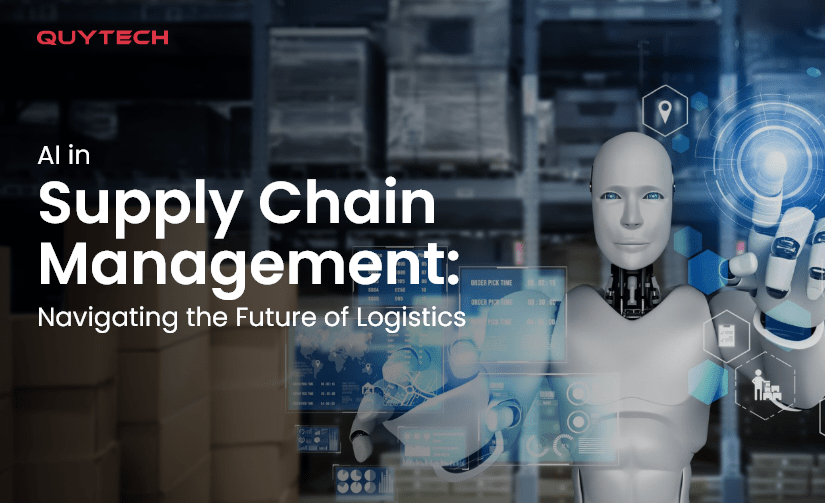Leading supply chain businesses worldwide are leveraging artificial intelligence because of its indefinite potential to streamline operations, automate repetitive tasks, minimize human errors, and other aspects of the supply chain.
According to the reports, AI’s worth will be approximately $17.5 billion in the global supply chain management software market by 2028. However, implementing AI in supply chain management is not as effortless as it appears.
With more opportunities, AI also brings challenges that are required to be addressed for effective integration of AI in supply chain management.
In this blog, Quytech has provided you with a detailed guide for AI in managing the supply chain. We have covered the use cases, AI solution development, benefits, and challenges that arise when using AI in supply chain management. So, let’s get started.
AI in the Supply Chain Management: Current Statistics
Following are some of the latest statistics for artificial intelligence in the supply chain.
Source: Market Research Future
- The AI in the Supply Chain market is projected to grow to $78 billion by 2030, exhibiting a CAGR of 8.50%.
- Global Generative AI in Supply Chain Market size will be worth approximately $10.2 billion by 2032 growing at a CAGR of 45.3% during the forecast period from 2023 to 2032.
- As per research, 76% of CEOs said they are deploying AI in supply chain management.
- Market analysis shows that supply chains powered by AI are 67% more profitable than non-AI alternatives.
These statistics show that businesses are embracing AI and using it for managing the supply chain.
Role of Artificial Intelligence in Supply Chain Management
There are numerous ways AI can be used in supply chain management. The top use cases of AI in the supply chain are as follows:
- Demand Forecasting
Businesses leverage artificial intelligence to forecast demand for products accurately by analyzing past orders, market trends, and more and optimize their supply chain accordingly.
- Inventory Management
A variety of industries leverage AI in supply chain management to optimize the inventory level of products. AI software plays a huge role in ensuring that the products or raw materials are available when required, ultimately leading to enhanced customer experience and smooth operations.
- Warehouse Automation
Artificial Intelligence is also used in machinery and robots to empower their functionalities. Thanks to AI, these automated machines and robots automation streamline warehouse operations by sorting, picking, packing, and shipping goods more efficiently.
- Quality Control
One cannot ignore AI when it comes to quality control. High-end systems powered by computer vision and machine learning check the products and materials and identify any kind of defects.
It also helps quality controllers improve the quality of the goods and materials and ensures that set standards are met perfectly.
- Supply Chain Planning and Optimization
AI also helps supply chain executives with planning and optimizing supply chain management. Artificial intelligence is used to provide data-driven insights and help planners in effective decision-making.
Moreover, generative AI-enabled chatbot assistants can help executives create reports, business proposals, product descriptions, etc., saving their time and allowing them to focus on other crucial tasks.
- Predictive Maintenance
Machine breakdowns cost huge amounts to the supply chain industry. Thus, companies use artificial intelligence-powered sensors combined with the Internet of Things technology to predict the maintenance of machines and reduce the chances of breakdowns.
- Supplier Relationship Management
Maintaining a healthy relationship with the suppliers is a crucial part of effective supply chain management. AI tools are used to analyze and provide data-driven insights into suppliers’ performance data and help companies identify potential risks involved, select suppliers, and negotiate processes.
- Delivery Tracking and Route Optimization
Leading logistics companies use AI to track delivery trucks in, and provide updates to the receiver in real-time. Moreover, AI is used to optimize delivery routes, helping delivery partners to deliver the shipment on time.
Also, AI-powered delivery robots and drones are used by logistics companies, like DHL, to deliver shipments on time, beating the traffic.
- Risk Management
There are numerous risks involved in supply chain management that can be minimized with the use of AI.
Artificial intelligence is used in the supply chain to identify potential risks beforehand, such as bad weather and shipment delays, and allow supply chain executives to take necessary actions.
- Security
Last but not least, artificial intelligence is leveraged in supply chain management for security purposes. Supply chain executives employ predictive analytics and anomaly detection algorithms to identify potential security threats such as fraud, counterfeiting, and theft.
AI analyzes transaction records, sensor data, and surveillance footage, identifies the gaps, and enables necessary measures to ensure the integrity and safety of supply chain operations.
Therefore, these are the top use cases of artificial intelligence in supply chain management.
How to Empower Supply Chain With AI
Now, let’s talk about how you can build custom AI systems to empower the supply chain of your business:

- Identify the Challenge
You need to identify the challenges you are facing in supply chain management and evaluate how AI can help you overcome them.
For instance, if you struggle with back-office operations, you can leverage generative AI-enabled assistants to streamline the back-office work.
- Hire an AI Development Company
To develop and integrate AI into the supply chain, you need the expertise and deep understanding of artificial intelligence, machine learning, and other related technologies.
Thus, it is recommended to get top AI development companies on board to develop and integrate AI for supply chain management.
- Data Collection and Preprocessing
The best AI developers will collect data from sources: internal and external. Internal data is collected from sources in your supply chain, such as past sales, customer details, inventories, supplier details, etc.
External sources include data such as market trends, weather records, traffic updates, etc. After collecting the data, they preprocess it to remove the unnecessary data and make it high-quality.
- Develop the Solution
After preprocessing the data, you need to develop the AI solution with the assistance of your development team.
Whether it is a chatbot powered by Generative AI or an inspection system driven by machine learning and computer vision, developing an AI solution tailored to your needs is crucial for overcoming supply chain challenges seamlessly.
- Train Solution With Data
Post-development, you must train the AI solution with the preprocessed data. You can leverage Adaptive AI and Natural Language Processing (NLP) while training the AI models to ensure optimal performance and accurate results.
- Testing
Once the training is done, you need to test the AI solution to check if it is functioning well. The testing phase will help you identify any potential issues or errors before deployment. Make the necessary adjustments and fix bugs if required.
- Deployment
Now, your AI solution is ready for supply chain management. However, we recommend you deploy on a small scale rather than on the whole supply chain. This way, you can check if it is optimized for your supply chain. Later, you can deploy it to the whole supply chain.
- Continuous Upgrade and Maintenance
You need to continuously upgrade your AI solution to ensure it stays relevant for a long time. Also, you can integrate other technologies, such as Blockchain to enhance the potential of AI-based supply chain management.
So, this is how you can develop an AI solution to empower the supply chain of your business.
Benefits of Using AI in Supply Chain Management
The following are the top benefits of leveraging AI in supply chain management:
- Improved Efficiency
AI improves the efficiency of the supply chain significantly. The technology enhances the precision of demand forecasting, helps employees manage the inventories well, reduces wastage, tracks deliveries, and more.
This increases the productivity of the supply chain executives and allows them to put their time and energy into other crucial tasks.
- Improved Forecasting Accuracy
AI helps in managing inventories better by analyzing past data, such as previous demand at a particular period, leading to reduced stockouts or overstock situations.
- Helps in Decision-Making
AI analyzes the data and provides supply chain executives with insights into trends and scope for growth. They utilize these insights to plan strategies and roadmaps and help them with data-driven decision-making.
- Cost Reduction
Another major benefit of using AI in the supply chain is cost reduction. AI helps supply chain executives optimize inventory levels, reduce transportation costs, and streamline logistics operations.
All these combined lead to a reduction of overall supply chain costs and improved profitability.
- Supply Chain Visibility
AI solutions provide comprehensive visibility across the supply chain. The technology enables supply chain executives to track inventory, check and monitor shipment statuses, identify potential inefficiencies, and more.
- Risk Management
Supply chain executives use AI and machine learning to find patterns and identify potential risks beforehand. This helps them manage the supply chain effectively by eliminating the risk or coming up with a backup plan.
- Enhanced Customer Satisfaction
With artificial intelligence, you can deliver shipments on time, fulfill customer demands efficiently, provide them with 24/7 assistance with chatbots, and more, resulting in enhanced customer satisfaction.
AI in supply chain management provides numerous benefits for a business. Connect with our team today to develop a custom AI solution tailored to your business.
Develop Custom AI Solution For the Supply Chain
Get a Free Consultation
Get in Touch
Challenges of Leveraging AI in Supply Chain Management
Leveraging AI in supply chain management is not as easy as it looks. There are numerous challenges you need to overcome for effective implementation of AI in the supply chain.
Here, we have mentioned the top challenges businesses face while integrating AI into their supply chain and Quytech helps them overcome these challenges.
Challenge #1. Businesses aren’t able to develop an effective AI solution or integrate it into an existing supply chain.
Solution: Most of the time, this situation arises when the in-house development team is incompetent to develop or integrate AI into existing systems. Thus, you must hire the right AI development company that has expertise and experience in developing AI solutions or integrating them into the existing supply chain systems.
Challenge #2. Supply chain systems have poor data quality.
Solution: You need to leverage high-end data cleansing and enrichment processes to ensure data quality. You can use advanced analytics techniques such as machine learning to fill in gaps, predict missing data, and enhance the quality of the data.
Challenge #3. AI systems in supply chain management may be vulnerable to cybersecurity threats.
Solution: You can implement robust cybersecurity measures, such as data encryption, network segmentation, and regular security audits and penetration testing, to protect sensitive supply chain data and AI algorithms.
Challenge #4. Implementing AI in the supply chain can increase overall costs.
Solution: Implementing AI into the in-house systems can increase the overall costs for a business. However, choosing SaaS-based solutions driven by AI is a cost-effective option most businesses are opting for these days.
Challenge #5. Many businesses are concerned about ethical considerations.
Solution: It is important to address ethical concerns, particularly those concerning data protection, and appropriate AI usage. Businesses must prioritize compliance with data protection legislation and ethical principles for AI systems handling massive amounts of sensitive data.
Hence, these are the top challenges faced by businesses and startups along with their solutions.
Get Started with Quytech!
The supply chain is one of the vulnerable industries that witness the most uncertainties. From shortage of products to delayed shipments, there are many things supply chain executives need to deal with.
With artificial intelligence, supply chain management becomes effective as the technology streamlines operations, tracks deliveries, manages inventories, and helps executives make data-driven decisions.
So, what are you waiting for? It’s the right time to choose Quytech’s best AI development services for your supply chain. Reach out to our team today, and we will guide you through the complete AI development and implementation process for your supply chain management. Visit: www.quytech.com
Frequently Asked Questions
Here are a few FAQs regarding AI in supply chain management.
There are many reasons to leverage AI for managing the supply chain. AI can optimize your supply chain by predicting demand, optimizing inventory levels, improving logistics, reducing costs, enhancing decision-making with real-time insights, and more.
Quytech is the best AI development company in India, with a presence in the USA. You can reach out to our team, and we will assist you in developing AI applications and software solutions tailored to your needs.
We need to know your requirements to quote you the cost of integrating AI into the supply chain. Hence, we request you to contact our team and share your requirements.



















Discussion about this post